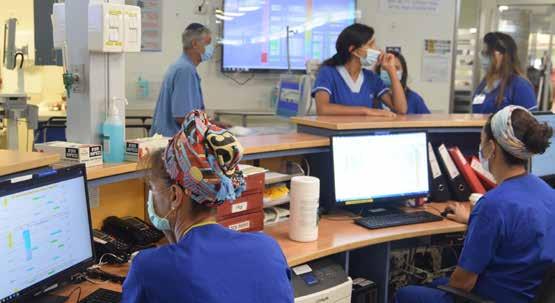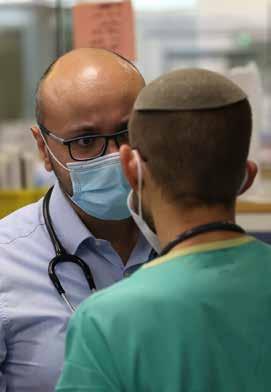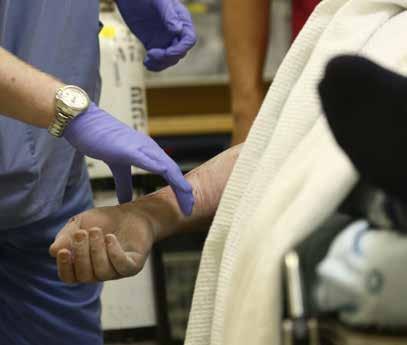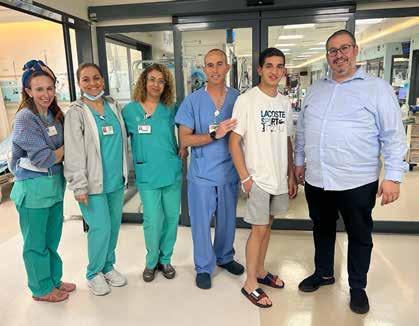
3 minute read
When terror strikes
from Heartbeat 2023
The Emergency Room at Shaare Zedek is always busy. A worried mother pushes a buggy with a crying baby in it, an adult with the help of walking sticks tries to hurry to get in line, an ambulance arrives with an injured person from a car accident and his family are close behind. This is a usual scenario; all walks of life and all situations arrive at Shaare Zedek. However, in recent months more than 50 wounded have arrived at the doors of the hospital from various terrorist attacks.
stabbing victim who was rescued from Jerusalem’s Givat Hmbatar neighbourhood, wounded from the shootings in Kiryat Arba and the explosion at the entrance to Jerusalem and then only last month Shaare Zedek treated victims of the devastating attack at a Synagogue in the City of David area of Jerusalem where 7 people were killed. When terror strikes in Jerusalem, our staff are on the front line.
Advertisement
Sara Goldberg who is the deputy head nurse of the Emergency Department shared, “Victims of terror attacks come here all the time, this is normal for us, but when there is an explosion, it is more of a challenge. There are more wounded, the information we get from the field is less clear and we must carry on as usual.”
Many of the staff of Shaare Zedek have worked in the hospital a long time and remember what it was like during the intifadas. When terror strikes again it conjures up emotions that they thought had been laid to rest.
At the entrance to the emergency department hangs a picture of the late Dr David Applebaum, former director of the department. In 2003, Dr. Applebaum was murdered in the bomb attack at Cafe Hillel in the German Colony in Jerusalem, along with five other people, including his late daughter Nava.
Sara shares, “Dr Applebaum would always come to the hospital when there were terrorist attacks. Sometimes even in pyjamas. He was very charismatic and well-loved at the hospital. That day in 2003, we waited and waited for him to turn up for work, and he did not show up. The feeling of someone I worked with being killed in an incident like this, still affects me today.”
Sara is 54 years old, a single mother of 4-year-old twins and an 11-year-old boy. In the morning of November 23rd, 2022, she was still at home, before a shift. “I got a call to announce that there was a multi-casualty incident. I told my son that he was not going to school and that he would stay at home instead, and I went to the hospital. Our team is very skilled, and we have procedures in place that we use to guide us through an incident like this. However, no matter how prepared we are, it is still emotionally challenging and affects us.
“You never get used to having to tell the father of a boy that his son was killed in a terrorist attack. Or tell the family that the father was killed. It does not matter how long you have been in the job. Nursing staff in an operating room, are accustomed to seeing difficult sights, but a terrorist event does something else. It is a threat to our normal life.”

Dr. Todd Zalut, agrees that an event such as the attack of November 23rd reminds him and his team of the second intifada. The fact that he has seen quite a few wounded throughout his years of work helps him, he says, to maintain relative composure in handling the incident. “You have no choice but to treat. You mostly think about work, and when the stress is over, you keep trying to get back to normal as soon as possible.”
Of the 23 victims from the November 23rd attack, 6 were treated for varying degrees of physical injuries and 17 needed to be treated for shock. Sadly, not everyone could be saved and 16-year-old Yeshiva student Aryeh Schupak z”l arrived in the Trauma Department in extremely critical condition, with multiple wounds. The staff fought to stabilise him, but he sadly succumbed to his wounds.
His close friend Elchanan Biton survived the attack and as he was being discharged from hospital, he remembered his friend,


“Aryeh was a young man who loved to learn and loved to help and in return was loved by all. I tried to pull him to the side but quickly realised that he had been killed by the blast.”
Elchanan’s family shared, “Elchanan has been through a deeply traumatic experience, but he arrived in a place that introduced him to the best possible messengers of caring who enveloped him with all the treatments that have allowed him to recover. We are very thankful to the doctors and nurses for their dedication and holy work.”
Shaare Zedek is an incredibly special place. To walk the corridors of the hospital you meet people that genuinely care about their work. People who are passionate and dedicated and want to help to save lives. What we must not forget is that they are human beings who must process trauma daily. Some are reminded of a time that they thought was long forgotten, some cannot forget the face of the innocent boy whose life they tried to save and there are staff who cannot sleep at night and carry a lot of difficulty who require psychological support.
These are the staff of Shaare Zedek; they are, caregivers, hope makers, warriors. They are Shaare Zedek Medical Centre.
This article has been shortened from a press piece that was published on israelhayom.co.il





